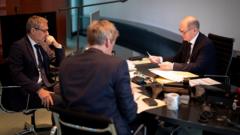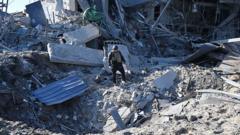In a significant phone conversation, German Chancellor Olaf Scholz addressed Russian President Vladimir Putin regarding the deployment of North Korean forces in Ukraine, labeling it a "grave escalation" of the ongoing conflict.
North Korean Troops in Ukraine: Scholz Warns Putin of Severe Escalation

North Korean Troops in Ukraine: Scholz Warns Putin of Severe Escalation
Chancellor Scholz urges Putin to withdraw troops amid rising tensions and calls for peace negotiations.
In a landmark phone call marked as the first direct dialogue between German Chancellor Olaf Scholz and Russian President Vladimir Putin since December 2022, Scholz conveyed his deep concern over Russia's reported deployment of North Korean troops in Ukraine, which he branded a "grave escalation." The German government's sources indicate that Scholz urged Putin to cease hostilities and call for the withdrawal of Russian forces from Ukraine.
Putin's Kremlin described the conversation as a "detailed and frank exchange," noting that the mere act of dialogue was seen as a positive development amidst escalating tensions. In reaction, Ukrainian President Volodymyr Zelensky referred to this interaction as a "Pandora's box," suggesting it may undermine the isolation of the Russian president.
Scholz expressed strong condemnation of Russia's military aggression and highlighted Germany's unwavering commitment to support Ukraine’s defensive measures against Russian advances. He particularly denounced Russian airstrikes on civilian infrastructure, calling for immediate negotiations to pave the way for a "fair and lasting peace."
During their hour-long discussion, the leaders agreed to maintain ongoing communication. Russian media reported that the initiative for the call came from Berlin. Aware of historical sensitivities, Germany’s government is cautious of appearing to negotiate a settlement that undermines Ukraine, particularly given memories of past conflicts involving Soviet and Nazi aggression in Eastern Europe.
Before speaking with Putin, Scholz briefed Zelensky about his intent, aiming for transparency and coordination. Following the conversation with the Russian leader, he plans to update Zelensky about the outcomes of their dialogue.
In the Kremlin's account of the discussion, Putin commented on the deteriorating state of Russian-German relations, attributing it to what he termed the German authorities' "unfriendly course." Putin stressed that any potential peace agreement must reflect "new territorial realities," hinting at the Ukrainian territories currently under Russian occupation.
Furthermore, he posited that a resolution would require addressing the "root causes of the conflict," alleging NATO's expansion in Eastern Europe as a significant factor leading to the unrest. Scholz has indicated that his push for renewed peace talks involves consultation with global leaders, including possible discussions with Chinese President Xi Jinping.
Scholz and Putin's last encounter occurred just prior to Russia’s extensive invasion of Ukraine. Following this invasion, which contradicted promises from Putin that he had no plans for aggression, relations between Germany and Russia soured drastically.
Germany, once reliant on energy and commercial ties with Russia, now stands as one of Ukraine's largest military aid donors, following only the United States. With German elections approaching in February, public pressure mounts on Scholz to facilitate meaningful peace negotiations. Far-right and left parties, whose combined support could significantly influence the election outcome, are confronting the government over its perceived shortcomings in addressing the crisis.
As the war continues to strain Germany's political and economic landscape, Scholz’s efforts to depict himself as a mediator might play a pivotal role in reshaping his political fortunes ahead of the upcoming elections.





















